In 2025, business messaging is no longer just about sending plain text. Rich Communication Services (RCS) has completely changed the way brands connect with their customers, offering a powerful upgrade over traditional SMS.
SMS is limited to 160 characters and cannot deliver media-rich content. RCS brings an app-like experience directly inside the user’s default message inbox without need of any separate app.
In India, RCS adoption has been growing at a rapid pace. Major telecom carriers like Jio, Airtel, and Vi have rolled out RCS support nationwide and most Android devices now come with RCS messaging enabled by default. This wide coverage means businesses can reach millions of users with interactive, visually engaging, and verified messages.
The benefits of RCS that hard to ignore:
- Rich Media Support: Send images, videos, carousels, and CTAs in one message.
- Verified Branding: Display your brand name, logo, and a verified badge for trust.
- Higher Engagement: RCS consistently delivers better click-through and conversion rates compared to SMS.
RCS business messaging is the next big leap. It combines the reliability of SMS with the engagement power of modern chat apps and 2025 is the perfect time to start using it.
What is RCS Business Messaging?
RCS Business Messaging(RBM) is a next-gen upgrade to the conventional SMS. RCS is a multimedia message that is delivered in the default Message Inbox. Plus RCS is not limited to the 160 characters for one message like SMS does, RCS text messages can contain up to 3072 characters.
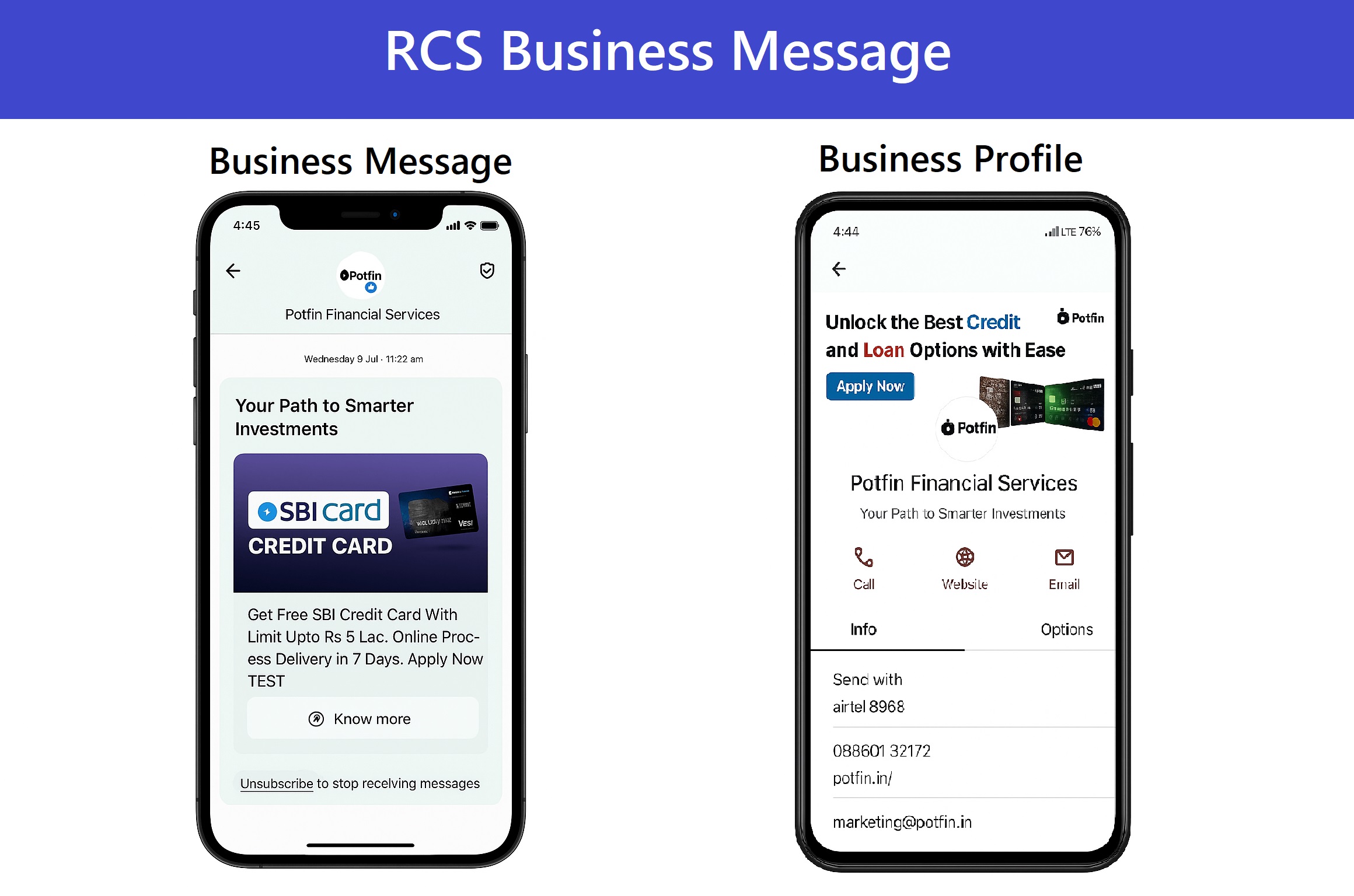
RCS is a change to the conventional SMS into rich media messaging for businesses. It allows businesses to send high-resolution media like images, videos, carousels, interactive buttons, and more.
RCS Business Messaging(RBM) also enhances security and trust through verified business profiles with logo and brand colors, and automatically falls back to SMS if RCS isn’t supported or delivered, ensuring broader message delivery.
Read More: RCS Messaging with SMS Fallback
RCS is built on IP-based messaging rather than the older SMS protocol. This means it supports read receipts, typing indicators, group conversations and even end-to-end encryption in some cases giving users an experience closer to WhatsApp or iMessage but without needing a third-party app.
In India, RCS is powered by mobile network carriers and supported through Google Jibe, which acts as the universal platform ensuring interoperability across different telecom operators and Android devices. This makes it easy for businesses to reach a wide audience without worrying about app installs or device compatibility.
For businesses, RCS Business Messaging opens up a powerful channel for marketing, customer engagement, and transactions. It combines the reach of SMS with the rich capabilities of modern chat apps.
Anatomy of an RCS Message
Many times in the message inbox, you might have seen the RCS message. But you had not recognized it because you were not aware of RCS at that time.
An RCS Business Message is more than just text. It’s a branded, interactive experience that lives directly inside a user’s default message inbox. Each component is designed to maximize trust, engagement, and conversion.
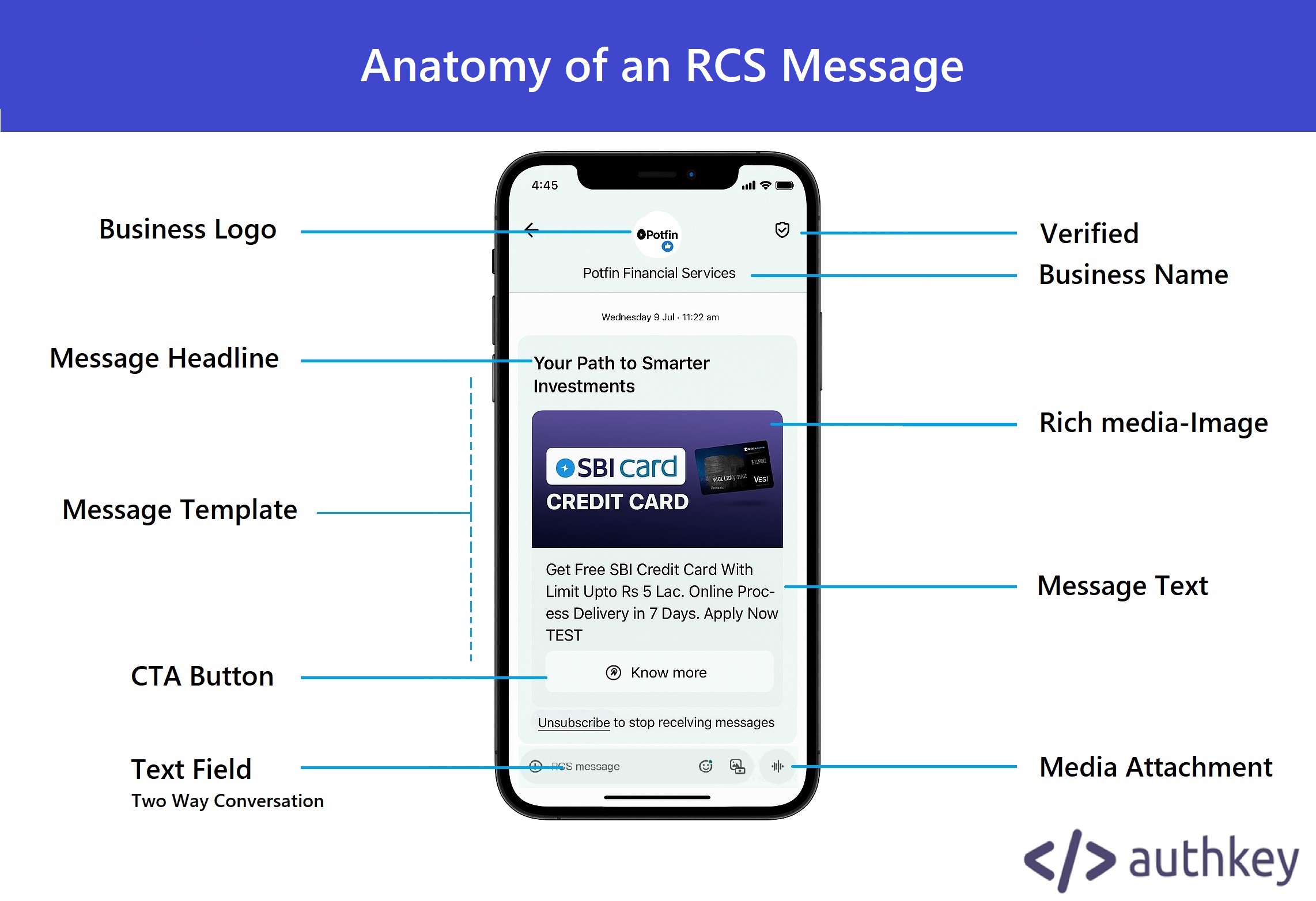
What makes up a typical RCS message:
- Sender Name & Verified Badge – Messages are sent from a verified business profile. Users see your official business name and a green checkmark-style badge, instantly building credibility and reducing spam concerns.
- Brand Logo & Colors – You can display your company’s logo and match the color scheme of the message to your brand identity. This helps create a professional, recognizable presence in the inbox.
- Rich Media Content – RCS supports images, carousels, GIFs, and even short videos, allowing you to create visually engaging messages that capture attention better than plain text.
- Interactive Buttons (CTA) – Add quick-reply options, website links, or call-to-action buttons (e.g., “Shop Now,” “Track Order”) that allow customers to act without leaving the conversation.
Analytics & Tracking – RCS messages provide insights like delivery reports, read receipts, and click tracking, helping you measure engagement and optimize future campaigns.
Key Capabilities RCS Provides Your Business
Rich Communication Services (RCS) is more than just an upgrade to SMS — it’s a complete transformation of how brands engage with customers. Here are the key capabilities that make RCS a game-changer:
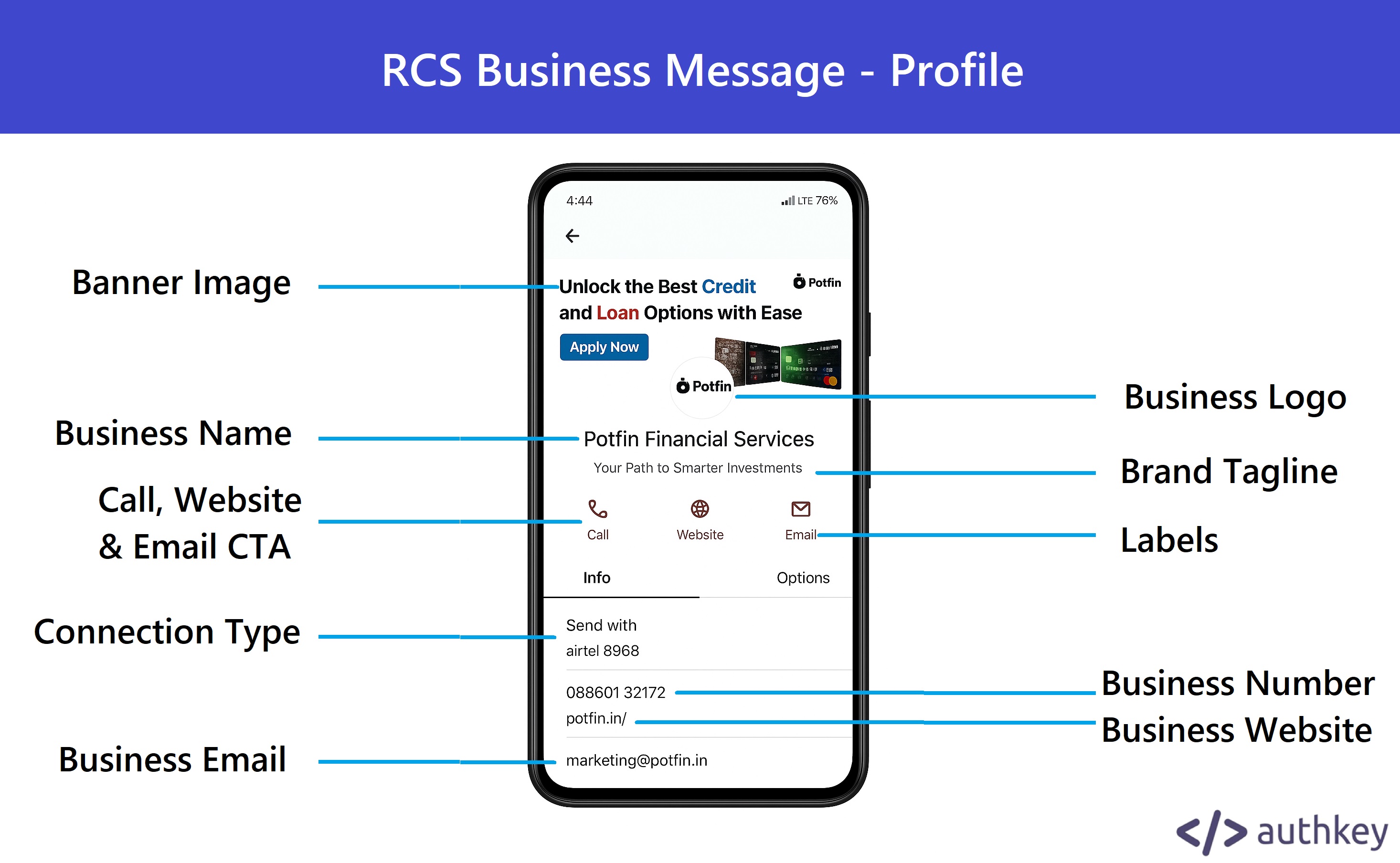
Verified Sender Profiles – Trust & Authenticity
With RCS, every message your business sends comes from a verified sender profile. Customers see your brand name, logo, and verification badge right inside their messaging inbox. This eliminates spam concerns and assures users that the message is legitimate.
Branded Messages – Logo, Colors, Business Name
Unlike plain SMS, RCS supports full brand personalization. Your company can display its logo, use brand colors, and add a business name at the top of the message. This creates a professional and consistent customer experience that matches your website, app, and other touchpoints.
Modern Interactive Features – Carousels, CTAs, Suggested Replies
RCS supports rich, interactive elements that turn a simple message into a mini-app experience. You can add carousels to showcase multiple products, clickable call-to-action buttons, and pre-filled suggested replies that make it effortless for customers to respond. These features significantly boost engagement and conversions compared to traditional SMS.
Cross-Platform Support – Growing Reach
RCS works natively on most Android devices and continues to expand through carrier partnerships worldwide. With Apple adopting RCS, iPhone users will soon receive the same enhanced experience, making it a truly universal messaging channel for businesses targeting a global audience.
RCS vs SMS vs WhatsApp: What’s the Difference?
When it comes to messaging your customers, you have multiple channels to choose from. But which one is right for your business?
SMS, RCS, and WhatsApp are three of the most widely used options, each offering unique advantages.
Here’s how they stack up so you can pick the best mix for your communication strategy.
SMS
SMS (Short Message Service) has been around for decades and remains the most reliable way to send short alerts, OTPs, and notifications. It works on every phone, no internet required. But it’s limited to 160 characters, lacks media support, and offers no sender verification or engagement tracking.
RCS
RCS (Rich Communication Services) is the next generation of SMS. It keeps the universal reach of SMS but adds rich media support, carousels, CTAs, suggested replies, and verified sender profiles. Customers see your brand name and logo inside their default messaging app, building trust and boosting engagement. RCS also provides delivery and read receipts, giving you data that SMS simply can’t.
Read More: RCS vs SMS in Depth.
WhatsApp Business API is ideal for businesses looking to create two-way, real-time conversations with their customers. It supports rich media, interactive buttons, templates, and automation via chatbots.
| Feature | SMS | RCS | |
|---|---|---|---|
| Message Type | Plain text (7-bit GSM encoding) | Text + Media + Rich Cards + Interactive UI (RBM spec) | Text + Media + Interactive Buttons + Chat |
| Character Limit | 160 characters per message (concatenation possible but billed as multiple SMS) | No strict character limit, supports rich payloads (JSON-based) | No strict character limit |
| Protocol / Transport | SS7 over cellular networks | SIP/IMS (IP Multimedia Subsystem) over data/Wi-Fi | Proprietary Meta messaging protocol over TLS |
| Device Compatibility | Works on all devices (basic feature phones + smartphones) | Native on Android Messages (Google Jibe Hub), Samsung Messages; coming to iOS 18 | Available only on smartphones (iOS & Android) |
| Media Support | None (MMS required for media) | Supports images, videos, GIFs, carousels, rich cards, file attachments | Supports images, videos, audio, documents |
| Branding & Verification | Alphanumeric sender ID or long code (no visual branding) | Verified business profile with brand logo, display name, theme colors | Verified business profile with official green tick |
| Sender Authentication | Minimal (header spoofing possible) | Verified by carriers & Google RBM (reduces spoofing risk) | End-to-end encrypted + official business verification |
| Interactivity | None | Suggested replies, CTAs, carousels, rich actions (call, map, website) | Quick replies, buttons, product catalogs, forms |
| Engagement Metrics | Only Delivered or Not status | Delivery, read receipts, button click tracking | Delivery, read receipts, message open tracking |
| Security & Encryption | Basic carrier security, no encryption by default | Transport-layer security via carrier (not E2E encrypted) | End-to-end encryption (user-to-business & user-to-user) |
| Fallback Handling | None (message fails if user out of coverage) | Automatic fallback to SMS if device not RCS-enabled | No fallback (fails silently if app not installed) |
| API / Integration | Yes, Simple SMPP or REST API | Yes, Authkey Provides RCS API | Yes, Authkey provides WhatsApp Business API |
| Cost | Very low, per-SMS charge | Competitive carrier-based pricing, slightly higher than SMS | Template-based pricing (per message/session) — higher for bulk |
| Delivery Speed | Instant (network dependent) | Instant (IP-based, faster for media-rich messages) | Instant (data-dependent, globally optimized servers) |
| User Opt-In | Not mandatory (DND rules apply) | Not mandatory (sender must be verified) | Mandatory — user must explicitly opt-in |
| Scalability | High, globally supported | Growing — limited to RCS-enabled carriers & devices | High — global, but user base must have WhatsApp |
| Best For | Transactional messaging: OTPs, alerts & notifications | Marketing Campaigns: Rich campaigns, branded offers, interactive engagement | Marketing, Support and Automation bots: Conversational support, customer journeys, personalized chat |
Authkey Helps You Use All Three Channels. You don’t have to choose just one channel. Authkey platform lets you send SMS, RCS, and WhatsApp messages from a single dashboard. So you can reach customers where they are, with the right message format every time. Whether it’s a simple OTP, an interactive RCS campaign, or a WhatsApp conversation, Authkey helps you get it done efficiently.
Types of RCS for Business Messaging
RCS (Rich Communication Services) gives businesses multiple ways to engage with customers — from simple alerts to fully interactive chat experiences. Here are the three main types of RCS you can use to elevate your communication strategy:
1. Basic Messages – Simple Text
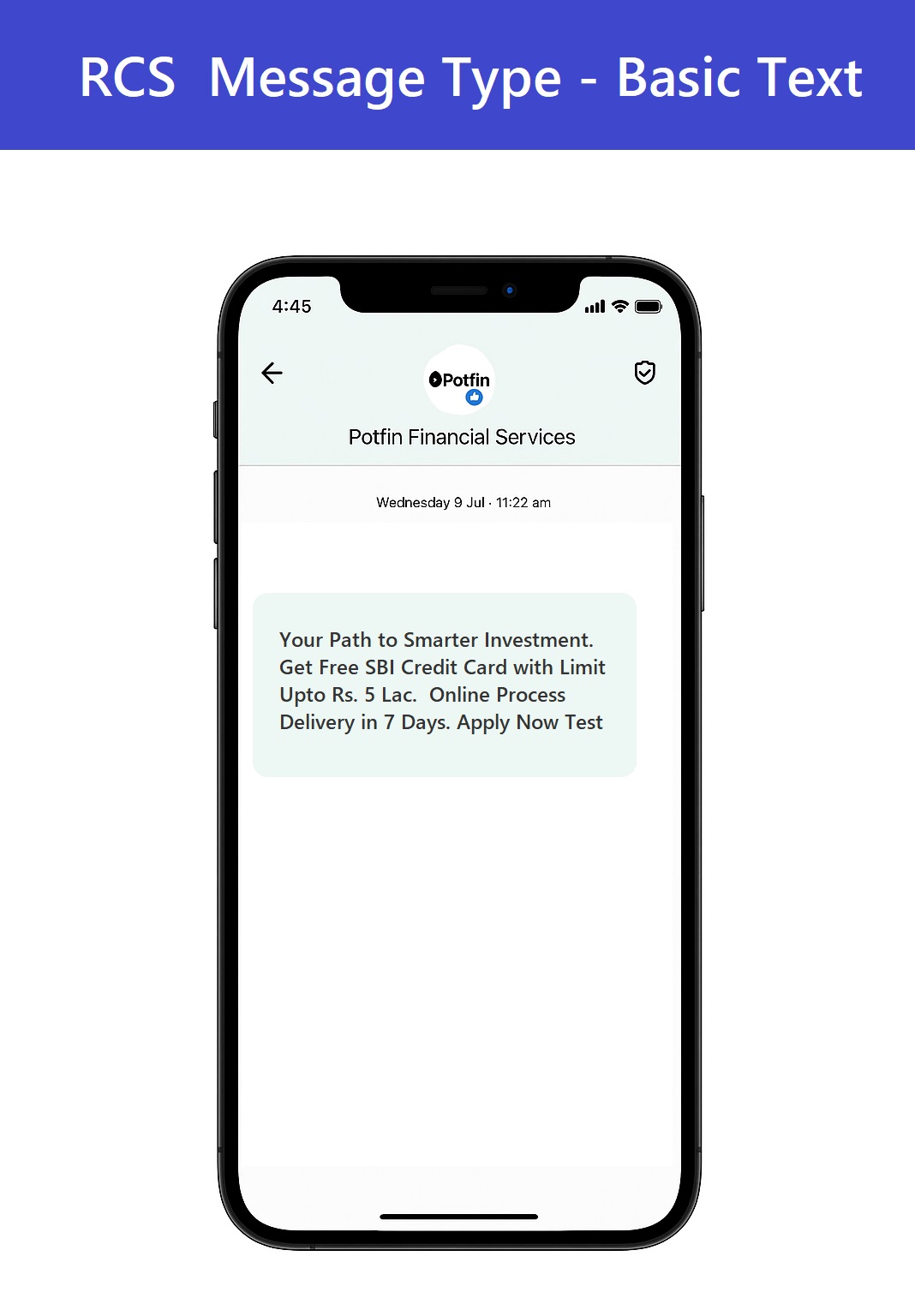
Think of this as the RCS equivalent of SMS — but better. Basic RCS messages are plain text messages that benefit from RCS delivery and read receipts, letting you know exactly when a message has been delivered and read. This type is perfect for quick alerts, reminders, OTPs, and service updates where no media is required.
2. Single Rich Messages – Image + Button
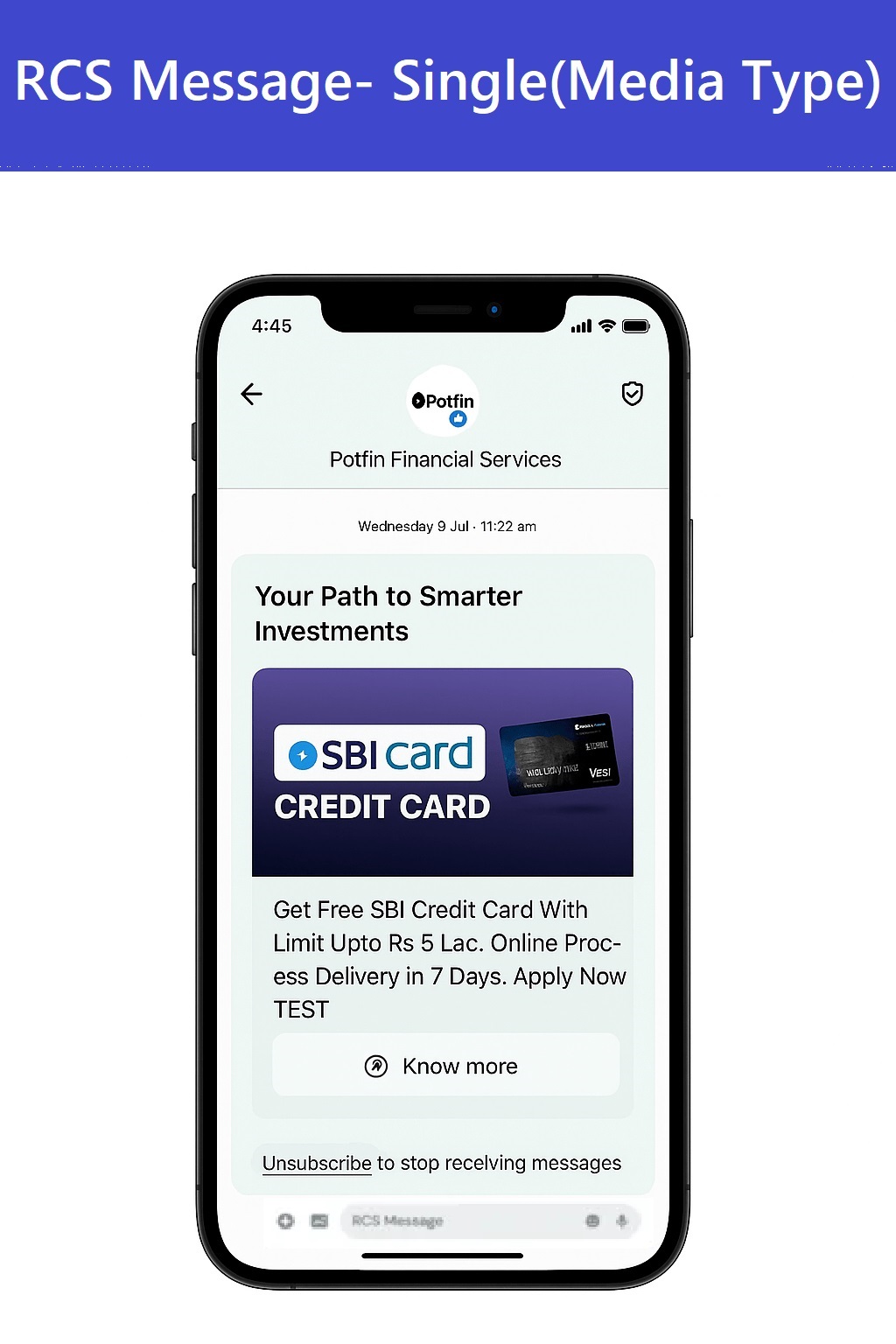
Single rich messages let you combine images, videos, or rich cards with a call-to-action button. For example, you can send a promotional image with a “Shop Now” button or a product video with a “Learn More” link. This format is highly engaging and ideal for marketing campaigns, announcements, or product showcases that need a visual element to grab attention.
3. Conversational Messaging – Two-Way Chat with Suggested Replies
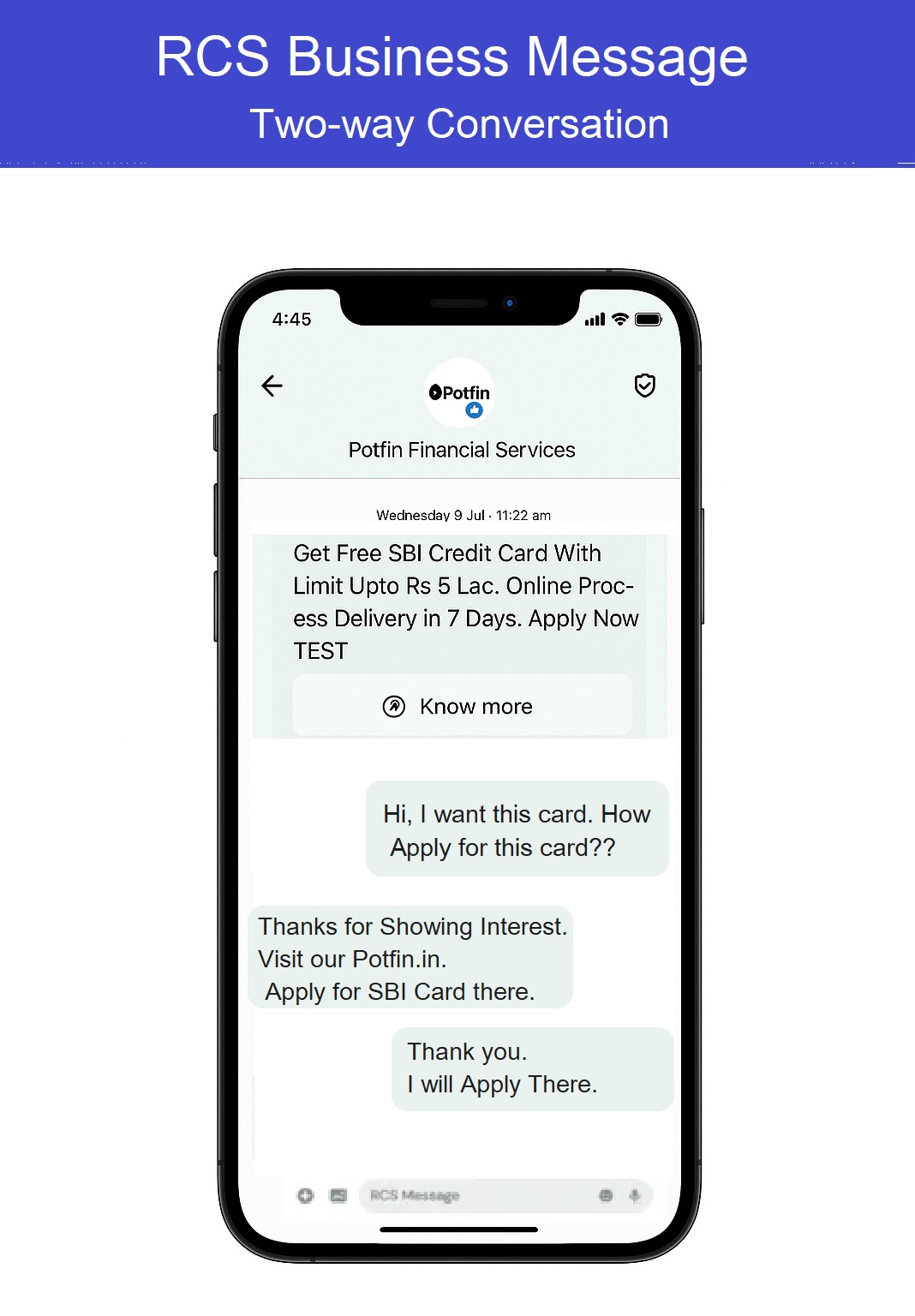
Conversational RCS is where messaging becomes truly interactive. You can create two-way chat experiences where customers can choose from suggested replies, browse carousels, and take action without leaving the conversation. This is perfect for customer support, booking systems, lead qualification, and guided shopping journeys.
At Authkey, we make it simple to design, send, and manage all three types of RCS campaigns from a single dashboard. You can mix and match formats depending on your use case and audience.
How to Start Sending RCS Campaigns in India?
1. RCS Onboarding
Before you can send RCS messages, your business must be verified and registered with carriers. This procedure is RCS onboarding. It happens through Google. This includes:
- Business Verification – Submit required documents (like PAN, website screenshots) for brand authentication.
- Brand Profile Setup – Configure your display name, brand logo, and theme colors to create a professional verified sender profile.
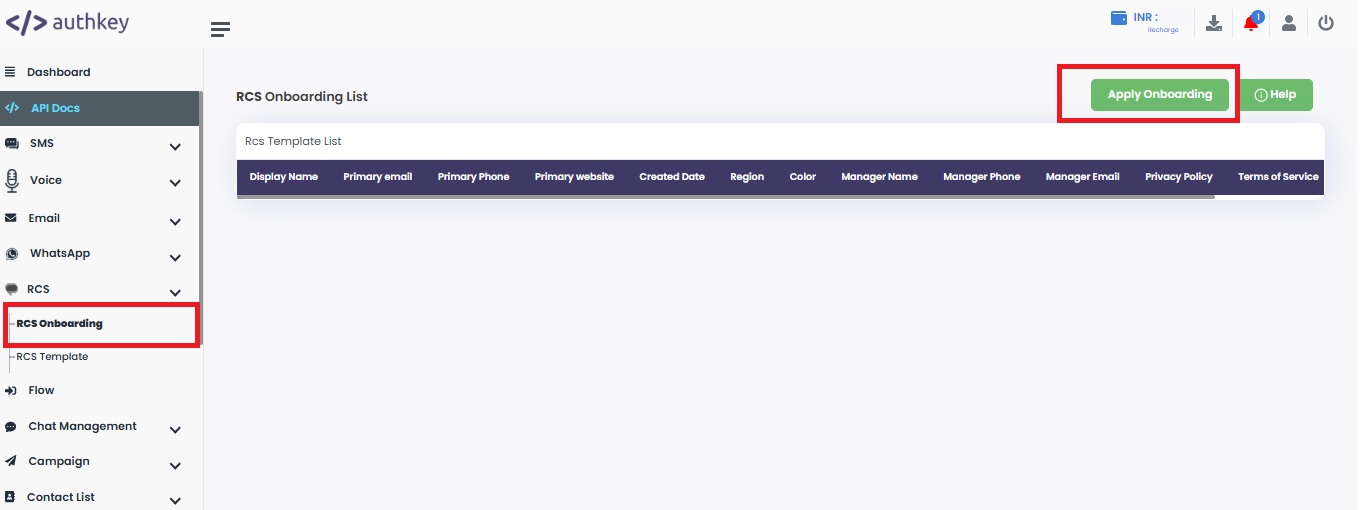
Read More: Complete RCS Onboarding | RCS Registration Guide
2. Create Template (Template Approvals)
Once you complete RCS Onboard process, next you can create RCS message templates for marketing, transactional, or service use cases.
- Design the Template – Choose from text-only, image + button, or carousel-rich messages.
- Add CTAs – Include quick replies, links, or “Call Now” actions to drive engagement.
- Submit for Approval – Authkey’s dashboard allows you to send templates for quick carrier approval.
3. Send RCS Message (Campaign or Transactional)
After your templates are approved, you can start sending messages:
- Bulk Campaigns – Reach thousands of users at once with offers, product launches, or updates.
- Transactional Messaging – Send secure OTPs, payment confirmations, and real-time alerts.
- Analytics & Tracking – Measure delivery rates, read receipts, and click-throughs to optimize performance.
RCS Business Messaging Use Cases
RCS Business Messaging allows brands to go beyond simple text and deliver rich, interactive, and branded experiences right inside the default messaging app. Here are some of the most powerful use cases where RCS can transform customer communication across industries:
Marketing Campaigns – Product Launches, Discounts
With RCS, businesses can run engaging marketing campaigns that feel like mini landing pages. Imagine showcasing your new product with a carousel of images, adding a “Buy Now” button, or promoting a limited-time discount with a direct CTA. Authkey makes it easy to create these campaigns without code and measure engagement through click and read tracking.
Read More: RCS Marketing: The Future of Business Marketing in 2025
Holiday Promotions – Festive Offers & Diwali Sales
Festive seasons are prime opportunities for customer engagement. Send personalized RCS messages featuring your holiday collection, gift ideas, or special discounts. Include interactive buttons like “Shop Now,” “Get Offer,” or “Locate Store” to convert interest into action instantly — perfect for Diwali, Christmas, or New Year campaigns.
Payments & Transactions – Secure OTPs & Updates
RCS is ideal for transactional alerts because it combines reliability with security. Banks and fintech companies can send OTPs, payment confirmations, and account updates with a verified sender badge, building trust and reducing fraud risks.
Customer Engagement & Loyalty – Surveys, Feedback
RCS enables interactive customer engagement. Run quick surveys or feedback forms with suggested reply buttons, offer loyalty rewards, or share personalized recommendations. Authkey’s analytics help track participation rates and refine your strategy.
Travel & Hospitality – Boarding Passes, Check-In Reminders
Airlines, hotels, and travel apps can send boarding passes, flight updates, hotel booking confirmations, and check-in reminders via RCS. With interactive buttons, travelers can easily view details, add bookings to their calendar, or get directions all without leaving their messaging app.
By using Authkey’s RCS platform, businesses across retail, finance, travel, and hospitality can combine reach, branding, and measurable engagement, turning every message into a customer experience that drives real results.
Carriers and Devices Supporting RCS in India
RCS Business Messaging is gaining strong momentum in India, thanks to widespread carrier and device support.
Major Carriers
The leading telecom providers as Reliance Jio, Airtel, and Vodafone Idea (Vi), have rolled out RCS support across their networks. This ensures that businesses can reliably deliver rich, interactive messages to millions of users without requiring a separate app or third-party download.
Device Support
RCS works on the majority of modern Android smartphones, including popular brands like Samsung, Xiaomi, OnePlus, Oppo, Vivo, and Google Pixel. Messages are delivered through the native Messages app (Google Messages) that is available on most devices, creating a seamless user experience.
With Apple officially adopting RCS, iPhone users in India will soon receive the same enhanced messaging experience, further expanding your campaign reach.
Challenges or Limitations of RCS
While RCS is a powerful upgrade over SMS, businesses should be aware of its current limitations before fully committing to the channel.
Device Coverage Not 100%
All the smartphone supports RCS messaging. Some older devices or users without RCS-enabled messaging apps may fall back to SMS, reducing the consistency of the experience.
Not Supported on iOS (Yet)
As of now, iPhones do not fully support RCS. However, Apple has announced plans to adopt RCS in 2024–25, which will eventually bring parity between Android and iOS users. Until then, businesses may need to maintain a parallel communication strategy using SMS or WhatsApp for iOS audiences.
Slightly Higher Cost Compared to SMS
RCS messages can be more expensive than plain SMS due to their rich media capabilities and carrier pricing models. However, the higher engagement rates and improved customer experience often justify the additional cost, making RCS a strong ROI channel for marketing and engagement.
Future of RCS in Marketing
RCS is not just a step up from SMS — it’s shaping the future of how brands will communicate with their customers. The next few years will see RCS evolve from a powerful messaging tool into a central hub for personalized, interactive marketing.
AI-Powered Personalization
With the rise of AI, RCS campaigns will become smarter and more relevant. Businesses will use AI-driven segmentation and personalization to send messages tailored to individual customer preferences — from product recommendations to dynamic offers that update in real time.
Integration with CRMs & Automation
RCS will increasingly connect with CRM systems and marketing automation platforms, enabling end-to-end customer journeys. Imagine sending a product carousel based on browsing history, followed by an interactive survey — all triggered automatically through your CRM.
Expected Growth in India
India is one of the fastest-growing markets for RCS adoption. With support from major carriers like Jio, Airtel, and Vi, RCS is expected to become a mainstream business messaging channel for e-commerce, banking, travel, and retail brands.
Apple/iOS Adoption Predictions
Apple’s announcement to adopt RCS will be a game-changer, bringing billions of iPhone users into the ecosystem. This will make RCS a truly universal channel, comparable to WhatsApp but without the need for app downloads or opt-ins.
Conclusion: The Future of Business Messaging is RCS
RCS is redefining how businesses connect with their customers — combining the reach of SMS, the richness of chat apps, and the trust of verified sender profiles. From marketing campaigns and holiday promotions to secure transactions and interactive customer journeys, RCS offers a single platform to engage audiences in a more meaningful, measurable way.
With expanding carrier and device support — and Apple’s adoption on the horizon — now is the perfect time to prepare your brand for the next era of messaging.
Ready to get started?
Start Your First RCS Campaign with Authkey →
